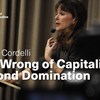attraction
“Most MPs are Not All that Sharp.” Political Employees and Representative Democracy
International Journal of Public Administration, Vol 40 (7), s 548-558 (2017) DOI: http://dx.doi.org/10.1080/01900692.2016.1157693 Abstract The article analyses the orientations of political employees in
"Most MPs are not all that sharp." Political employees and representative democracy
Working Paper 2016 no. 2(Published in International Journal of Public Administration, Vol 40 (7), pp 548-558 (2017) DOI: http://dx.doi.org/10.1080/01900692.2016.1157693) This paper analyses the orient
Persistent boundaries. Partnership patterns among children of immigrants and natives in Sweden
Journal of Ethnic and Migration Studies Abstract Integration theories assume that ingroup partnering (endogamy) among individuals of immigrant background declines as their exposure to majority society i
Putting the person in to the particle
Report on seminar 'Modelling Social Mechanisms for Knowledge Generation & Exploration' by Nanda Wijermans (Stockholm Resilience Centre) Over the last decade physicists have developed “social force”

Sovereignty and sustainability - friends or foes? Interview with Steven Vanderheiden
To limit the global warming to a maximum of two degrees above pre-industrial levels, much of the coal and oil reserves on earth must stay in the ground. This requires international agreements to limit
Climate policy in British Columbia: An unexpected journey
Frontiers in Climate 4 Abstract Since introducing a path-breaking carbon tax in 2008, the western Canadian province of British Columbia (BC) has attracted significant attention from climate policy schola
Consequentialism and Robust Goods
Utilitas, 1–9, doi:10.1017/S0953820819000116 Abstract In this article, I critique the moral theory developed in Philip Pettit’s The Robust Demands of the Good: Ethics with Attachment, Virtue, and Respecvirtue and respect. I argue that Robust-Goods Consequentialism fails because it implies very implausible value judgements.

Chiara Cordelli: The Wrong of Capitalism Beyond Domination
Political philosophy is witnessing a revival of critiques of capitalism. Against those who argue that capitalism is unjust because of (i) its distributive outcomes, (ii) the oppression of workers at t
Malcolm Fairbrother: Trust and Public Support for Environmental Protection
Dr Malcolm Fairbrother, University of Bristol ABSTRACTMost people say they are concerned about the serious environmental problems confronting the world today and threatening the well-being of future ge

The (New) Case for Wage-Earner Funds
Research seminar with Markus Furendal, Post-Doc in Political Science, Stockholm University, and Martin O'Neill, Professor of Philosophy at University of York. Abstract In our presentation we make the








